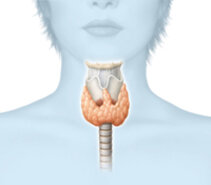Thyroid and parathyroid surgery

Our high-volume university medical center for endocrine surgery at the department of General and Visceral surgery specializes in treatments for thyroid and parathyroid disorders. Disorders of the thyroid gland are very common and include functional disorders (hyper-or hypothyroidisms), benign lesions, large goiters and cancer. Even though all thyroid disorders require an interdisciplinary approach, surgery is often the cornerstone of treatment. In our center for endocrine surgery all our operations are performed in microsurgical technique and embrace state-of-the-art neuromonitoring to reduce the risk of vocal cord injury.
The main procedures include
- completely removing the thyroid gland (total thyroidectomy)
- removing part or half of the thyroid gland (hemi-thyroidectomy) or
- removing the entire thyroid gland with the relevant lymph nodes in the neck in cases of cancer
The parathyroid glands are small organs that are situated near the thyroid gland and regulate the body's calcium metabolism. The most common reason for surgery of the parathyroid glands is an overproduction of the parathyroid hormone (and in return calcium) from an enlargement of a single gland. Rarely, more than one gland is affected or other reasons such as an inherited disorder or cancer are the reason for the enlargement. Either way, the surgical removal of the affected parathyroid gland is the treatment of choice. Preoperatively, modern targeted imaging will help us to establish the diagnosis and detect which gland is responsible for the overproduction. In surgery, only the diseased tissue can then be safely removed, whilst preserving the healthy glands to ensure a normal calcium metabolism.
We work closely together with our colleagues from the department of endocrinology and nuclear medicine to ensure our patients receive a timely diagnosis and the best possible care pre-and postoperatively. For cancer patients, each treatment option and decision is discussed in our specialized interdisciplinary tumor conference.